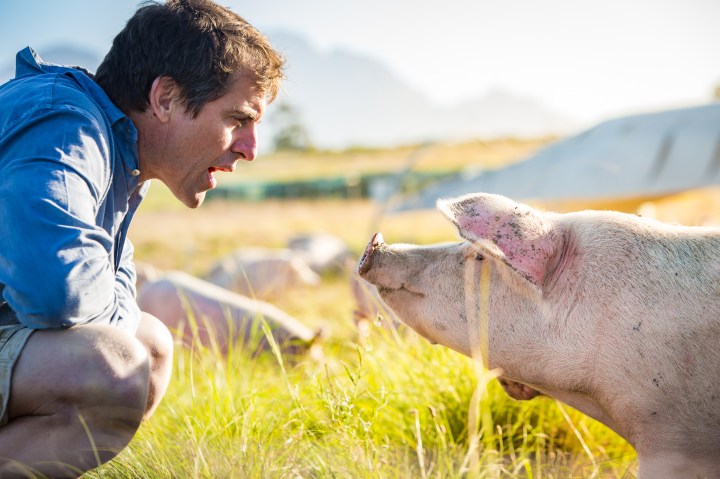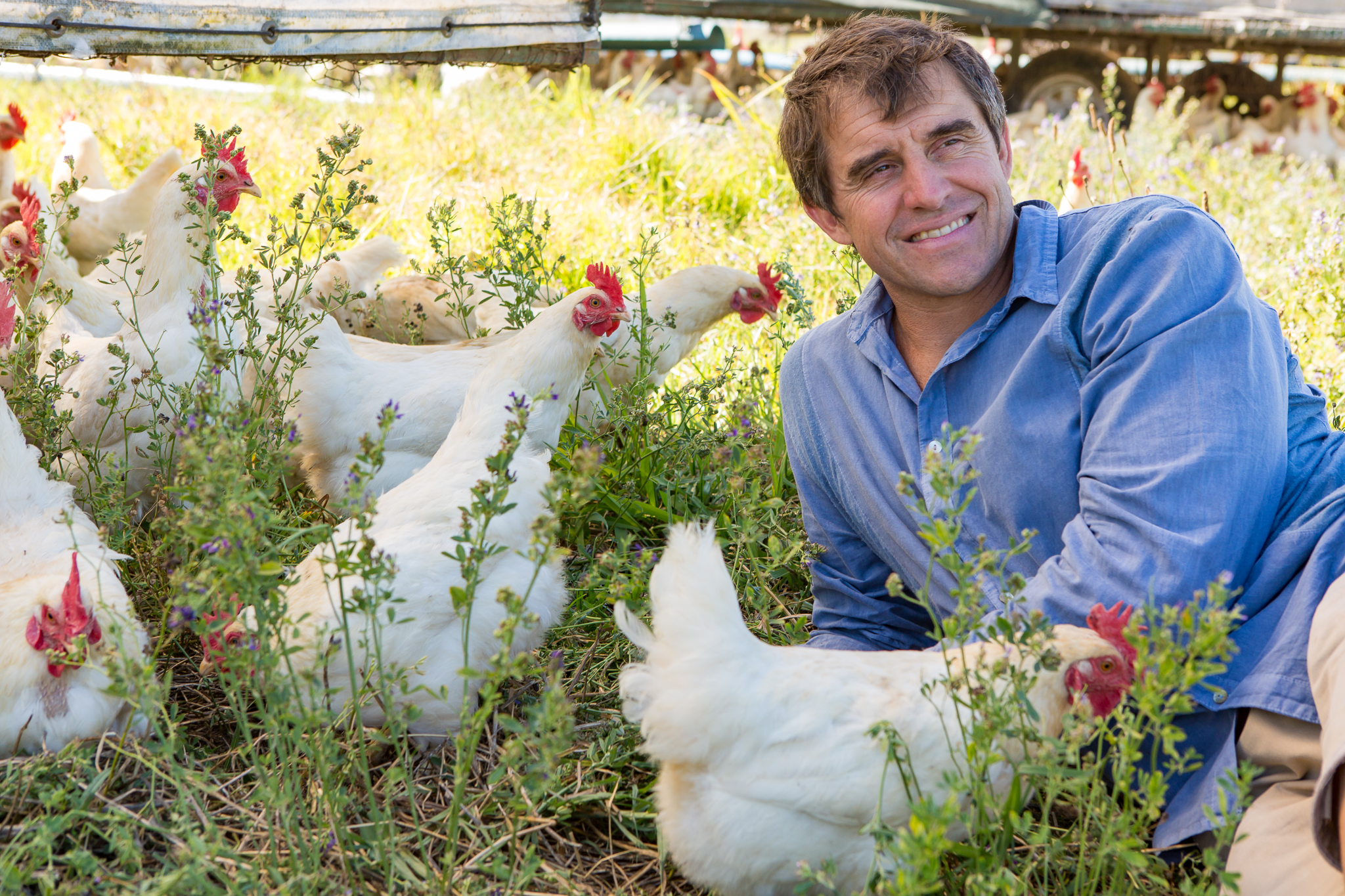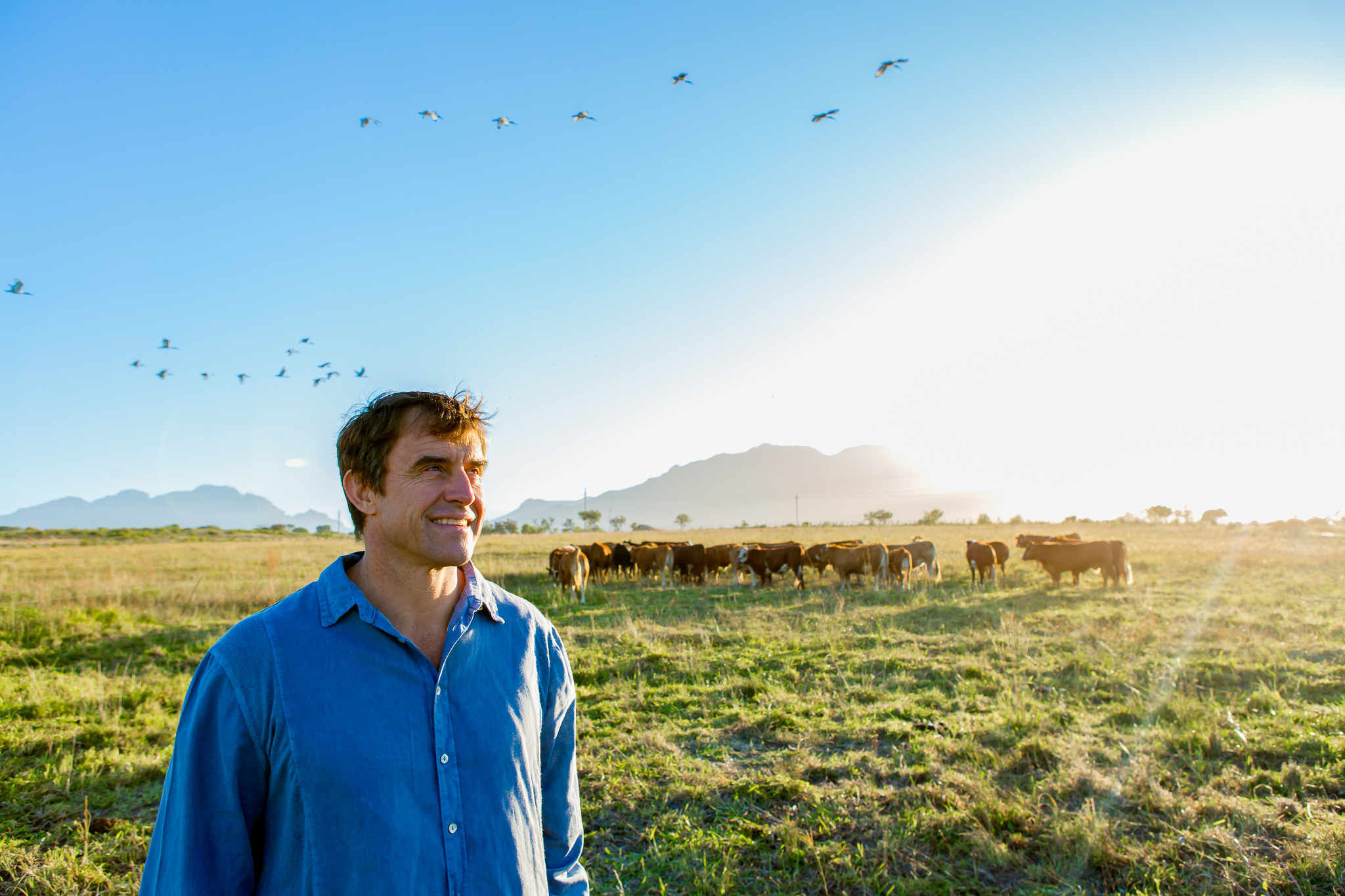FARMER’S BEEF
If you think organic food is expensive, try cancer

For two years running South Africa has been named as the most unhealthy country in the world. And Angus McIntosh (Farmer Angus) is determined to do something about it.
Farmer Angus McIntosh has the intense look of someone with a single dream like skateboarding to the South Pole. He wears a slightly ingenuous expression, as if he has just been born into a new world and finds everything curious and a bit disturbing.
With a background as a trader for Goldman Sachs in London, there is a hint of cufflinks and striped shirt in his farmerish attire and smooth talk. However, his verbal spritz no longer sprouts derivatives and hedge funds but involves a passion for environmentally friendly farming.
And boy do you need passion. In a world where farming is a big industry (visiting a farm in the USA is hazardous because of free floating poisons), following a dream of clean food is a kind of madness.
Farmer Angus’ farm is situated on 126 hectares of irrigated pasture at Spier Wine Estate near Stellenbosch. It is a place that ignites the heart with its well cared for animals, green pastures, vegetable gardens and on site butchery. A friend calls it “fairyland”.
The farm arguably hosts the Cape’s best non-industrial food production. The eggs are yolky and delicious and the meat which can be ordered online is clean and tastes like meat used to taste. Remember? Before feedlots, pesticides and hormones.
About six years ago I discovered his eggs by chance, astonished by their creamy innards and thick marigold coloured yokes. Investigating their origin, I came across Farmer Angus, moving his egg laying hens in “eggmobiles” to new outdoor pasture.
He told me then, “The biggest lie in agriculture is free range eggs. They live in barns, they don’t range outside. On commercial egg farms, chickens live and never leave a space equivalent to an A4 piece of paper.”

(Photo: Supplied)
And it is not only the animals that are benefitting. His egg company is now 80% owned by his staff and the eggs get better and better. “I am only a 15% shareholder but it’s got my name on it,” he says.
Over the years McIntosh has developed biodynamic and regenerative agricultural practices in the raising of the farm’s animals which include cattle, pigs, chickens and laying hens, as well as vegetables and wine.
His pastured livestock and poultry are moved frequently to new pastures where they can perform basic needs such as dustbathing and flapping their wings.
Often in the past in butcheries or so-called organic groceries, I have asked about provenance. So far I have never met a retailer who has even taken the trouble to see where the food (particularly labelled as “organic”) they sell comes from.
Farmer Angus encourages people to visit the farm and see where their food is produced. Caring for the animals properly is a high priority. More and more restaurant owners around the world are keeping their own herds for the simple reason that cared for cattle produces not only the healthiest but the tastiest meat.
With farming there is so much wonkery – what irony that the salt of the earth, the food we eat is as about as full of corruption as the Zuma Cabinet.
His desire is for people from all walks of life to be able to eat better and more nutritiously and to understand what they put in their bodies. On the face of it it is a modest dream but in South Africa it is as difficult as climbing Everest in a pair of Jimmy Choos.
The challenge of agricultural sustainability has become more intense in recent years with climate change, water scarcity, degradation of ecosystem services and biodiversity, the sharp rise in the cost of food, agricultural inputs and energy, as well as the financial crisis hitting hard on South Africa.

(Photo: Supplied)
South Africa should be the land of milk and honey; instead it is the land of cheap chemicalised food. “We have the highest obesity rate in the world. The rural Africans understood the value of milk, a whole food, but they lost the tradition when they came to the cities to work.”
Personally, says Farmer Angus, “I think that consumers have to think about food differently and eat differently. They need to be conscious that behind a kilo of tomatoes lies a lot of work. They need to know where their food comes from and what goes into it.
“People are living on more and more processed foods, so the body is craving nutrients. The only thing that the people in agriculture agree on is that the nutrient content of food has been in decline for 120 years. The carrots your grandmother ate and the ones you eat might look the same but on a nutritional level they are entirely different.
“Most of us can grow our own vegetables, we can all make our own worm compost which is the best fertiliser of all. South Africa has got a million unemployed people. Why are they not growing their own food? Here’s why. There is a stigma attached to farmers which is why so few guys grow their own food in a place like Khayelitsha. They want to wear zoot suits and drive Beemers.”
McIntosh’s new project is producing first grade grass fed, pesticide free food at an affordable price. Last week, wandering the aisles of Checkers, I came across such usually unaffordable products as pancetta, coppa, prosciutto at a price within my budget.
Let us give thanks for the pig.
Pancetta made from the belly, coppa from the neck and prosciutto from the leg and Black Forest ham to die for from the loin, a real feast.
But not a feast for pigs, especially in South Africa. “I only know two farmers who do not cage their pigs,” says McIntosh. The European Parliament’s Agriculture Committee has recently called on the European Commission to propose a revision of the EU directive on farmed animals with the objective of phasing out the use of cages in animal farming.
McIntosh’s move to supermarket selling is not only significant because people like me can afford to buy it but it is the first time that grass-fed beef is being sold at the same price as feedlot products.
“But more important,” says Farmer Angus, “this is a truly costed item. The beef you buy in a shop is not really costed, the antibiotic resistance is not costed, the inflammatory diseases you get are not costed. There is a whole lot of stuff that is not in the price, so true cost accounting is another thing that has to be on the table in order to keep any ethical enterprise going.”
“This stuff has been outdoors reared, it is not imported and most important it has been cured without adding nitrates or nitrites plus the chemical arsenal that fires up most commercial foods. Our charcuterie, made by Gastro Foods, is the only charcuterie in South Africa cured without added nitrates or nitrites.
“We have the space, we have the weather, all we need is the absolute desire for better nutrition.
“And there are rewards. The carbon in our soil has increased and we get paid credit for that. What people don’t realise is that the vegan diet that everyone is trying to ram down our throats is destructive to the ecology. Whereas this is generative to the ecology. In the vegan utopia there are no animals, so how do they make the food for the plants? They can’t make animal based fertiliser or compost so they have to use chemicals.
“Actually, we have no choice. We go the ethical route or we die.”
As Joel Saliton, a farmer in the USA famous for his ethical practices, says, “If you think organic food is expensive, try cancer.” DM/TGIFood
Fanie Ferreira, acting CEO of the Milk Producers Organisation, responds to the above article:
The article by Lin Sampson titled ‘If you think organic food is expensive, try cancer’, dated 20 August 2021, refers.
The extent of misinformation in the paragraph dealing with dairy is of concern to the Milk Producers Organisation and the insight in animal husbandry of the writer of the article frightening. For ease of reference the dairy paragraph is copied in:
“A well looked after Jersey cow that has grown up on pasture should give you 50 lactations. Do you know what the average lactation in South Africa is? Two point one. They are treated as monogastrics and fed a heavy corn diet three times a day. As a result the milk is so high in pus that they are forced to homogenise it.” The reference to 50 lactations implies the age of the cow is 50 years and that she calved down 50 times. A very superficial literature study will reveal that this statement is void of all truth.
The comment regarding the reason for milk to be homogenised indicates total ignorance. The purpose of homogenisation is to disintegrate or finely distribute the fat globules in the milk, in order to reduce creaming. Pus consists mainly of dead tissue and dead white blood cells and homogenising will have no effect on it, if it is present in the milk.
The Milk Producers Organisation would appreciate a correction, with an apology to the industry and consumers.
Note: The story has been amended.





 Become an Insider
Become an Insider
I read this article with interest until I reached the final paragraph in which Farmer Angus states authoritatively: “… the vegan diet… is destructive to the ecology.” It is in fact quite the contrary. The deforestation occurring in the Amazon is being done to clear land to grow soya beans, the second largest component in an industrial animal diet after maize. 80% of the maize and soya produced globally goes into animal production. If all humans on earth converted to a vegan diet we would need far less land to produce for our food requirements and thus vast tracts of land could be “rewilded”.
I’m happy for Farmer Angus that he is proud of his regenerative farming techniques. The fact is that if all meat demand was to be catered for with this approach, the land area required would be equivalent to 5 planet Earths. He would be wise to concern himself with his own farming operation instead of making ostensibly informed, but ultimately starkly ignorant, statements about meat production and consumption.
I would also be interested to hear on what planet a Jersey cow could give 50 lactations, when her natural lifespan is 25-30 years (with a maximum of one lactation per year, together with a pregnancy). And lastly, he speaks of “the ethical route”; I wonder how he thinks killing animals, that don’t want to die, is ethical?
There are indeed inspections of organic farming operations. My ex- tenant is one such person, locally based.
Yes, they do exist but they are unregulated in SA. If you’re referring to the claim of 50 lactations, I can assure you (as a former professional animal scientist) that this is utter nonsense, even if she were housed in Ritz like conditions.
Quite correct – as an organic dairy farmer, I was very pleased with ten to twelve lactations!
Quite incorrect – organic farmers are subject to a voluntary standard (see saoso org) which is implemented by third party inspections, or by second party Participatory Guarantee Systems (see my book be googling Auerbach CABI for free download).
As a professor of soil science and plant production, I have been researching and publishing on organic farming for fifty years!
Thanks Raymond, but I don’t think you read my comment. You refer to organic farmers being subject to a voluntary standard, which is the point of what I said. Regardless of the admirable efforts of SAOSO, if the standards are voluntary then they are by definition unregulated (as I said), meaning that anyone can claim to be an “organic” farmer and not face legal consequences. Hence why terms such as “free-range”, “cruelty-free”, “sustainably farmed” and indeed “organic” have little credibility is SA, as I’m sure you would know.
Lyn, how I would love to meet Farmer Angus! All my life I have been involved with horses (not racing and TBs) and on retirement from the commercial world, moved to the Knysna area and bought that green valley between the Buffels Bay turnoff and Lake Pleasant on the N2 for my remaining horses. I needed cattle to ‘clean up’ the camps between the horses and a neighbouring farming vet sold me 8 black Aberdeen Angus cows and a bull. That was in 1992. They have never been artificially fed, they just eat grasses and clover. It never stops growing, so the cattle don’t have to move much! No hormones, no drugs apart from maybe twice a year external Deadline if the wind or wildlife has brought in ticks, and they breed like rabbits! When I made enquiries as to whether they could be classified as organic I was told, “…only if the neibouring farms were also organic!” Which meant their neighboring farms also had to be organic, and so on until the end of the flat earth! I don’t even have to add artificial fertiliser, flooding brings in extra 10cm of silt from the surrounding mountains and catchment area. Havoc for 24 hours, then you can even hear the grass grow. So, what is ‘organic’? How ‘natural’ do you have to be? I only wish I could slaughter the bullocks on my farm and then transport to the abattoir instead of them leaving their heaven on a lorry and entering a terror until put out of their misery at least 24 hours later, sometimes longer.
You really want to take health advice from a rabid antivaxxer?
Nothing he says can possibly have any credibility.
Fully agree! Just read what he says about vaccines – scary stuff. As much as quite liked his take on organic farming etc., it is more than somewhat tainted by his take on vaccines.